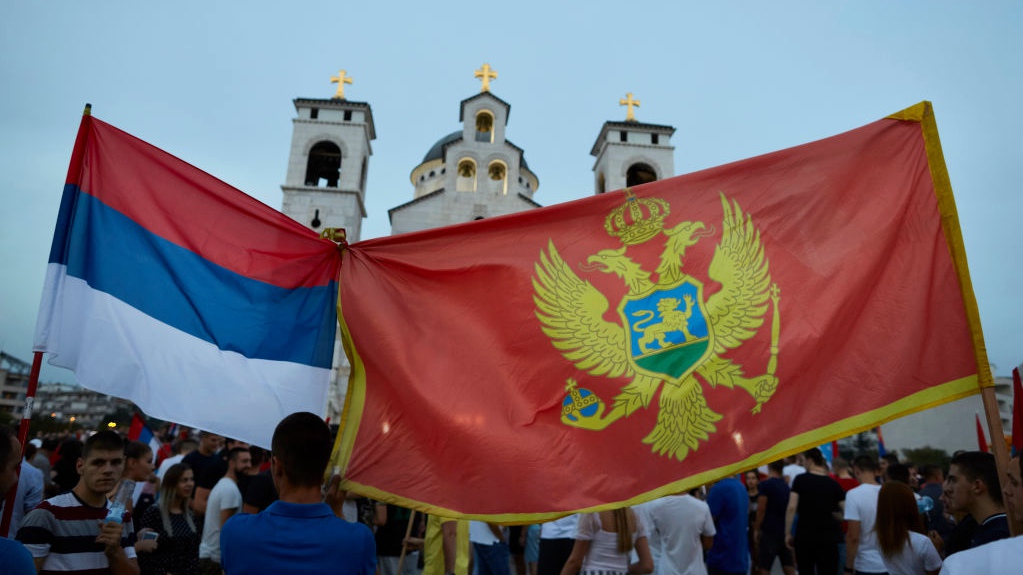
A Serbian and a Montenegrin flag are tighted together as thousands of people celebrate the victory of a coalition of Serbian nationalist and pro-Russian parties in Montenegro's parliamentary elections, in Podgorica, Montenegro, August 31, 2020. /Getty
A Serbian and a Montenegrin flag are tighted together as thousands of people celebrate the victory of a coalition of Serbian nationalist and pro-Russian parties in Montenegro's parliamentary elections, in Podgorica, Montenegro, August 31, 2020. /Getty
Serbian Prime Minister Ana Brnabic on Sunday revoked an earlier move to expel Montenegrin Ambassador Tarzan Milosevic following a row over an interpretation of history between the two countries.
Brnabic said Serbia wanted to extend "the hand of cooperation and friendship" to Montenegro. She said the decision was made after her meeting with Serbian President Aleksandar Vucic.
Serbia on Saturday gave Milosevic 72 hours to leave after Montenegro expelled Serbian Ambassador Vladimir Bozovic.
Podgorica declared Bozovic persona non grata for "interfering in Montenegro's internal affairs," a foreign ministry statement said citing remarks he had made about history.
Bozovic on Friday labeled a 1918 assembly – which decided Montenegro should forgo independence and join Serbia and become part of the Kingdom of Serbs, Croats and Slovenes – a "liberation."
It was a "free expression of people's will to unite with fraternal Serbia," he told a meeting of an association representing Montenegrin Serbs.
"Bozovic in the most direct way belittled the state which gave him a diplomatic hospitality," the foreign ministry in Podgorica said.

Government supporters gather at Independence Square for the "No Excuses, Montenegro Calls" themed demonstration in Podgorica, Montenegro, September 6, 2020. /Getty
Government supporters gather at Independence Square for the "No Excuses, Montenegro Calls" themed demonstration in Podgorica, Montenegro, September 6, 2020. /Getty
The Adriatic state of 600,000 was a kingdom until 1918 when it abolished its sovereignty to join the Kingdom of Serbs, Croats and Slovenes, which changed its name to Yugoslavia in 1929.
Montenegro stayed in a union with Serbia after Yugoslavia fell apart in the early 1990s, and declared independence in 2006. But tensions around national identity are still haunting the nation, where ethnic Serbs make up 29 percent of its population.
In 2018, Montenegrin lawmakers adopted a resolution annulling the decisions of the 1918 assembly.
Relations between the two neighbors further strained since three opposition coalitions – dominated by the pro-Serb nationalistic camp – won a majority in Montenegro's parliamentary elections in August. After the elections, supporters of the pro-Serb coalition gathered for days in the thousands to celebrate, waving Serbian flags and chanting nationalistic songs.
The outgoing government that expelled Bozovic will be succeeded by a new pro-Serb cabinet of the parties.
(With input from AFP, Reuters)

